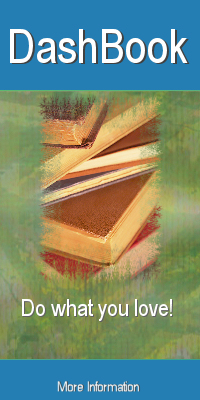When we first started working on the design of DashBook, our software for handling royalties, we had great help from a book publisher who was dissatisfied with the systems out there. They had old interface styles with data crammed in screens, one was a web-based system that barely did anything, and others were very expensive yet you couldn't test them out by yourself.
Since we released DashBook a few years ago, we have had a wonderful welcome from the community of book publishers, and have been prodded by the music industry to make great enhancements in our system for them.
We can always come up with more ways to make our royalty accounting system better. There will be more ways to make it faster to use, have it handle more things automatically, and even still there may be some odd calculation style that can be added.
But what we value the most is our user feedback. Sometimes we have been staring at our screens too long to notice obvious improvements that someone who just downloads our free trial will point out. That's wonderful!
We are very happy that our customers and reviewers let us know how we can best change DashBook to suit their needs. DashBook has grown to be the best value out there in all price ranges due to our simply listening and reacting to the comments and suggestions we receive.
If you would like an alternative to generic accounting systems like QuickBooks, so that you can take advantage of easy specialized royalty calculations, importing of your sales data, and professional reports that are easily emailed or copied to folders on the internet, you owe it to yourself to check out DashBook! The program that your industry has grown.
Monday, November 29, 2010
Tuesday, November 2, 2010
Help other publishers
Publishing is not a zero-sum game. If a customer were to only purchase one product (book, song, etc.) in their lifetime, then yes, that customer would no longer be available for any other publisher or vendor. But it doesn't work that way, of course.
We all know that consumers consume, and some of them do it quite often and in mass quantities. However, what they consume and how they consume it is fickle. There was a time when consuming media meant a newspaper or a book. Times have shifted toward multi-media information from the internet, electronically printed books, audio books, movies, etc. So help generate a feeding frenzy for what you have now.
What this means is that as a publisher of a particular media type or genre, it behooves you to embrace your competitors! If everyone but you abandons a field, you are alone, so you surely do not want your customers leaving your area of interest.
Seek out your competitors and start communicating. Perhaps you could team up to develop a convention or even a #tweetchat. When you brainstorm with yourcompetitors new comrades, you will come up with many ways to target this common market that can be mutually beneficial.
Don't think that you have to "go it alone," as that is not the best way of doing it.
I'd love to hear your experiences of working with other publishers.
We all know that consumers consume, and some of them do it quite often and in mass quantities. However, what they consume and how they consume it is fickle. There was a time when consuming media meant a newspaper or a book. Times have shifted toward multi-media information from the internet, electronically printed books, audio books, movies, etc. So help generate a feeding frenzy for what you have now.
What this means is that as a publisher of a particular media type or genre, it behooves you to embrace your competitors! If everyone but you abandons a field, you are alone, so you surely do not want your customers leaving your area of interest.
Seek out your competitors and start communicating. Perhaps you could team up to develop a convention or even a #tweetchat. When you brainstorm with your
Don't think that you have to "go it alone," as that is not the best way of doing it.
I'd love to hear your experiences of working with other publishers.
Subscribe to:
Comments (Atom)
